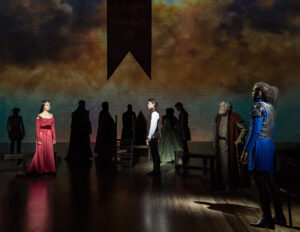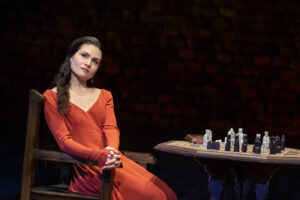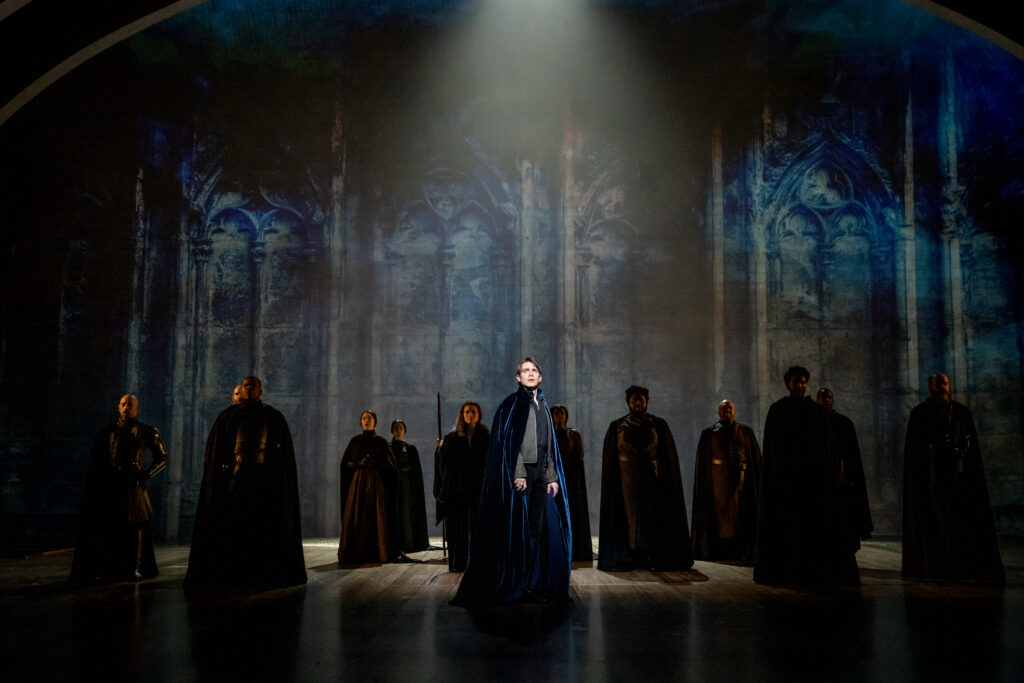A Royal Mistake
BY CHRISTOPHER BYRNE
If, as the epilogue suggests, Camelot existed for “one brief shining moment,” that moment is nowhere to be seen in the revival of the 1960 musical on the stage

at the Vivian Beaumont. This overwrought, ponderously polemical exercise in trying to make a classic “relevant” that has been foisted on theatergoers by adapter Aaron Sorkin and director Bartlett Sher achieves nothing quite so much as putting the “meh” in Camelot, to put it mildly.
The book was never the musical’s strong point. Lerner and Loewe’s score was, and the original is from a time when the book of a musical could be flimsy, if the score delivered some popular hits. Camelot was the sine qua non of this. Though the original production got mixed reviews, Robert Goulet appearing on the Ed Sullivan Show made it a hit.
However, in trying to make Camelot appeal to a contemporary audience, which the producers apparently feel wants more substance in its light entertainment, Sorkin has stripped every bit of magic out of the script. Gone is anything supernatural, anything fantastical, from the sorceress Morgan le Fay to the myth that grows up around Lancelot that he brought a knight he killed in jousting back to life. (The original lets this be obscure; perhaps the knight was just knocked cold, but it stands as a comment on a credulous mob, whereas Arthur in this retelling, who takes the place of the knight in the joust to “boost morale” at the Round Table, actively denies it.) Morgan le Fay has become a “scientist,” which in the 13th century (or thereabouts), one supposes, would have been a witch; it makes no sense. T. H. White’s book on which this is all based, The Once and Future King, is clear that Camelot is a fictional place. However, Sorkin has made it England, which makes Arthur more analogous to Henry V and his battles with the French.
Perhaps the most egregious corruption of the Arthurian legend is that to become king Arthur pulled the sword from the stone only after countless attempts by others had loosened it. He has not been anointed by fate; he hit the slots when they were ready to pay off. The point of all this is that by rejecting and replacing magic and myth with an attempt to be literal, the show becomes like one of Shakespeare’s lesser history plays, pedantic, and tiresome. Moreover, it’s inconsistent. Merlin here is still magical, though his magic isn’t really explained, and he’s not lured away to a long sleep; he simply croaks, like any ordinary mortal. It’s hard to comprehend why the producers would go in this direction, particularly given the popularity of the fantastical and wizardy in our culture now in things like The Lord of the Rings, Game of Thrones, Harry Potter, and many more.

Yes, the score is still intact. And, yes, it sounds fantastic. That’s one of the features of these sprawling Lincoln Center revivals. It’s wonderful to hear the full orchestrations, and the subtleties of the score. Thanks again to Ed Sullivan, many of these songs—“If Ever I Would Leave You,” “C’es Moi,” “Camelot,” “The Lusty Month of May,” and more—became popular hits when the original production was on Broadway. They still are among the most beloved songs in the American songbook.
Still, they are not enough to salvage this production. Sher has set the action on the cavernous stage of the Beaumont with only a few set pieces, relying on projections, so much of the action is lost—and much of the time the company seems to be wandering around in a void. At times the actors are so far upstage it’s hard to see them, which is odd considering that the thrust stage would actually allow greater intimacy with the audience. The poor choice to keep everyone at a distance undermines the emotional connection the audience needs to feel with the characters.
Sadly, the performances are only average as well. Andrew Burnap as Arthur rarely rises above generic in voice or acting. Like Shakespeare’s Henry V, Arhtur’s arc is from callow youth to commanding monarch, but other than getting loud and angry one wouldn’t know. Taylor Trensch, Arthur’s illegitimate son, is a bratty Mordred, not a plotting traitor. (In this telling, Mordred was conceived in a one night stand with Arthur at age 15 and the much older Morgan, and both Mordred and Morgan have simmered in resentment since. See a shrink, and leave us alone.) Mordred represents the evil that ultimately undoes Camelot, and Trensch has neither the presence nor the vocal skill to make his soliloquy, “The Seven Deadly Virtues” anything other than a throwaway, when he should be staking his claim to his dastardly nature.

Phillipa Soo is also misdirected. Soo, who was amazing in Hamilton, delightful in Amélie, or more recently as Cinderella in Into the Woods, and has a pure and delightful soprano; never finds the depth of Guenevere. She, too, arrives in Camelot as a virtual child (“Where are the Simple Joys of Maidenhood?”) but becomes a canny political manipulator (“Then You May Take Me to the Fair”), but Soo is girlish throughout, and in baiting the knights to fight Lancelot, she seems more like the medieval Regina George (the villain from Mean Girls) than a queen. Her Guenevere is also completely devoid of sex, and one of the conflicts inherent in Camelot is between purity of spirit and carnal lust. While her voice is gorgeous, it’s impossible to feel for Soo’s Guenevere. And then there’s Lancelot. Jordan Donica has a great voice to be sure, though he underplays “If Ever I Would Leave You.” Lancelot who arrives as a paragon of purity ultimately succumbs, seemingly against his “iron will” he likes to brag about, to his own passion. However, Donica’s performance is so stony that it feels like there isn’t enough flint on the planet to strike a spark from that adamant. Sadly, though Lancelot and Guenevere end up in the clinch that seals their fate, there’s no evident chemistry between Soo and Donica. It all feels mechanical.
That ultimately is why this production fails. The essential argument of Camelot is whether the mythic ideal of human purity is achievable. The tragedy of Camelot is that we are humans, not gods. We strive and fall short, and yet we keep striving. Our perfect ideal, briefly glimpsed, slips from our grasp. It is the classic stuff of quest literature, which thrives on magic. Removing—and working against that magic—leaves this production earthbound…and muddy.
Camelot
Vivian Beaumont Theater at Lincoln Center
150 West 65th Street
Tues, Thurs 7 p.m.; Weds, Fri Sat 8 p.m.; Weds, Sat 2 p.m.; Sun 3 p.m.
Tickets from $39 at Telecharge
2 hours, 55 minutes, 1 intermission
Photos by Joan Marcus
Published April 18, 2023









More Stories
Broadway Review: Art
Fall Arts Preview: Emus, Foxes and Eric Clapton, Too
Diane DiMassa Book Event September 25